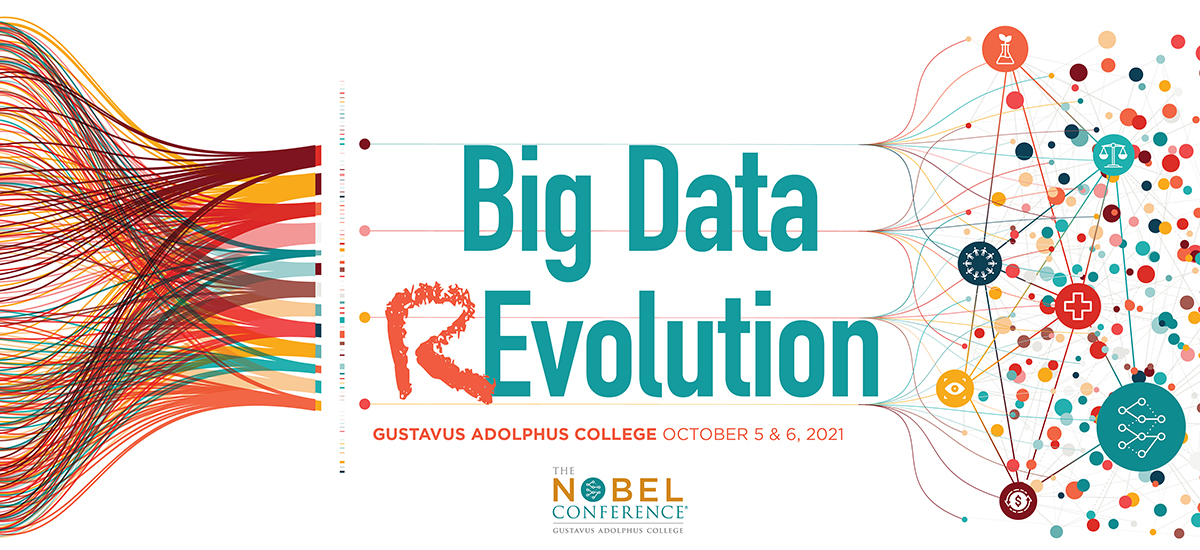Nobel Conference 57, Big Data REvolution, will take place virtually October 5-6. The annual conference hosted by Gustavus Adolphus College will dig into how Big Data is changing our lives along with the challenges and opportunities this transformation presents.
In less than a generation, nearly every piece of personal, scientific, and societal data has come to be stored digitally. Stored information is both an intellectual and an economic commodity; it is used by businesses, governments, academics, and entrepreneurs. The velocity with which it accumulates and the techniques for leveraging it grow at a pace that is remarkable and often intimidating. But this revolution also promises hope in areas as diverse as public health, drug development, child welfare, and climate change. To discuss the science, technology, and ethics of Big Data, a group of seven world-leading experts will present individual lectures and join together for group panels to discuss the ramifications—and possibilities—of this proliferation of data.
Speakers include:
- Talithia Williams, PhD, professor of mathematics at Harvey Mudd College | “Data-Driven Decision Making: Now and Imagined”
- Francesca Dominici, PhD, Clarence James Gamble Professor of Biostatistics, Population, and Data Science; co-director of the Data Science Initiative at Harvard University | “How Much Evidence Do You Need? Data Science to Inform Environmental Policy During the COVID-19 Pandemic”
- Michael Osterholm, PhD, Regents Professor and McKnight Presidential Endowed Chair in Public Health; director of the Center for Infectious Disease Research and Policy at the University of Minnesota | “From the Village Watchman to Actionable Data: A Challenging Journey”
- Cynthia Rudin, PhD, professor of computer science, electrical and computer engineering, and statistical science; director of the Prediction Analysis Lab at Duke University | “Interpretable Machine Learning”
- Pilar Ossorio, JD, PhD, professor of law and bioethics at the University of Wisconsin | “Justice in Machine Learning/AI for Health Care”
- Rhema Vaithianathan, PhD, professor of health economics; director of the Centre for Social Data Analytics at the Auckland University of Technology | “Child Protection: Too Much and Not Enough”
- Wendy Chun, PhD, Canada 150 Research Chair; leader of the Digital Democracies Institute at Simon Fraser University | “Discriminating Data”
The 2021 Nobel Conference lectures will be held virtually from 9:30 a.m. to 5 p.m. CDT each day. The conference and individual lectures will be livestreamed for free with no pre-registration required. In addition to the expert lectures, additional content includes a celebration of “The Arts at Nobel Conference 57” and a series of Big Data resources that are relevant to everyone from high school students to data science professionals to lifelong learners.
 This year, the Nobel Conference will kick off with a special pre-event lecture through a partnership with the Minneapolis-based Westminster Town Hall Forum. On Monday, October 4, at 12 p.m. CDT, Dr. Wendy Chun will discuss “Democracy’s Digital Dilemma” and answer live questions from the Westminster audience. The forum is free and open to the public and will be streamed live on the Westminster Town Hall website and the organization’s Facebook page.
This year, the Nobel Conference will kick off with a special pre-event lecture through a partnership with the Minneapolis-based Westminster Town Hall Forum. On Monday, October 4, at 12 p.m. CDT, Dr. Wendy Chun will discuss “Democracy’s Digital Dilemma” and answer live questions from the Westminster audience. The forum is free and open to the public and will be streamed live on the Westminster Town Hall website and the organization’s Facebook page.
“Accumulating data is not a new activity. Governments, industries, think tanks, and even sports teams have always tracked and accumulated information—about public health, about consumer purchasing patterns, about population trends,” Nobel Conference 57 co-chairs Thomas LoFaro and Karl Larson say in the conference program. “The evolution and use of big data sets have generated significant practical, ethical, and policy-related questions, as well as many controversies. What happens to all that data? How much control do you have over its use? Can we use big data to improve medical treatment, business operations, social services, and human relations?” The 57th annual Nobel Conference will explore all these questions and more.
Virtual attendees are encouraged to explore the Nobel Conference schedule and tune in for the full two days or select individual lectures. All lectures and associated events are free and open to the public at the Nobel Conference website.
The Nobel Conference® at Gustavus Adolphus College was the first formal lecture program in the world to be given the official authorization of The Nobel Foundation, Stockholm. It remains the only lecture program in the United States given that honor by The Nobel Foundation in Stockholm.

Leave a Reply
You must be logged in to post a comment.